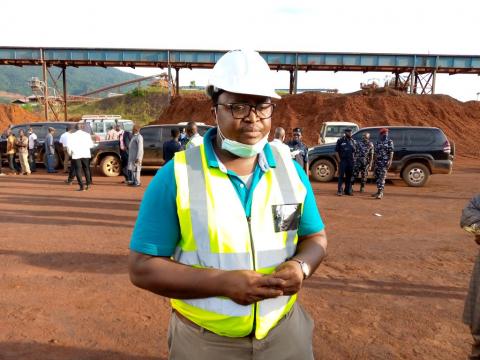By Mabinty M. Kamara
In an effort to ensure Civil Society’s effective participation in the Kimberly Process-Artisanal and Small Scale Mining (KP-ASM), the German international development agency, GIZ, has hosted a day long regional civil society engagement, designed to build the capacities of the participants on the process.
The purpose of the engagement, according to officials, was for the SCOs across the Mano River Union to strategize and plan ahead of the coming year.
The KP-ASM is an offshoot of the Kimberly Process Certification Scheme (KPCS), which came into being during civil wars in the region, as a response to the so-called ‘Blood Diamond.’ The scheme provides a platform for the certification of minerals before they leave their countries of origin to avoid the sale of what has become known as conflict diamonds.
The regional approach, which is implemented by the GIZ, with funding from the German Federal Ministry for Economic Cooperation and Development (BMZ) and the European Union (EU), aims to improve law enforcement and better secure the production from mining to export, as well as to secure government revenues and ensure greater beneficiation of diamond mining communities within the four MRU countries of Sierra Leone, Guinea, Liberia and Cote d’Ivoire.
The Kimberly process is a multilateral international trade regime that was established in 2003 and brought together government, world diamond industry players and civil society coalition, with the goal of preventing the flow of conflict diamonds.
The European Union and the four MRU countries are part of 55 countries in the world that are members of the Kimberly Process.
This week's engagement held at GIZ’s Country office at Wilkinson Road in Freetown brought together the identified CSOs working on artisanal mining and human rights in Sierra Leone, Liberia, Guinea and Cote d’ Ivoire. The event held virtually was meant to discuss and produce four national and one regional operational plan bordering on the capacity building needs for CSOs, and strategies to address their needs.
According to officials of GIZ, the work with CSOs on the process started with the mapping of civil society organizations operating in the sub-sector of ASM in the four MRU countries, from which 48 were selected, 11 of them from Sierra Leone.
In her opening statement during the event, Marie-Joséphine Nsengiyumva, Project Manager, Regional Resource Governance in West Africa (REGO) - Sierra Leone & EU, noted that CSOs have a crucial role as independent observers within the process.
“Their role is to improve/ensure transparency and accountability, to ensure compliance with standards of production and supply chain, and to defend the interest of ASM communities,” she said.
She added that some of the CSOs in the MRU collaborate well with ASM stakeholders and communities.
“They express political will and are strong in taking human rights and environmental aspects into consideration. We would like to build on this foundation and strengthen capacities where needed, to achieve a strong civil society that is defending the interest of the communities,” he said.
In his key note address on behalf of the MRU Secretary General, Mr. Jamba Mara, recognised the turnout of the CSOs to plan for their interventions towards good governance of the ASM, which he said has produced significant impact.
“Your massive presence to this present platform clearly demonstrates the importance you attach to the regional approach and your willingness to continue to contribute to good governance for the ASM to ensure the good of the mining communities in respect for social and environmental rights,” he said, adding that it is important for the MRU to continue building the capacities of the CSOs.
Copyright © 2020 Politico Online








